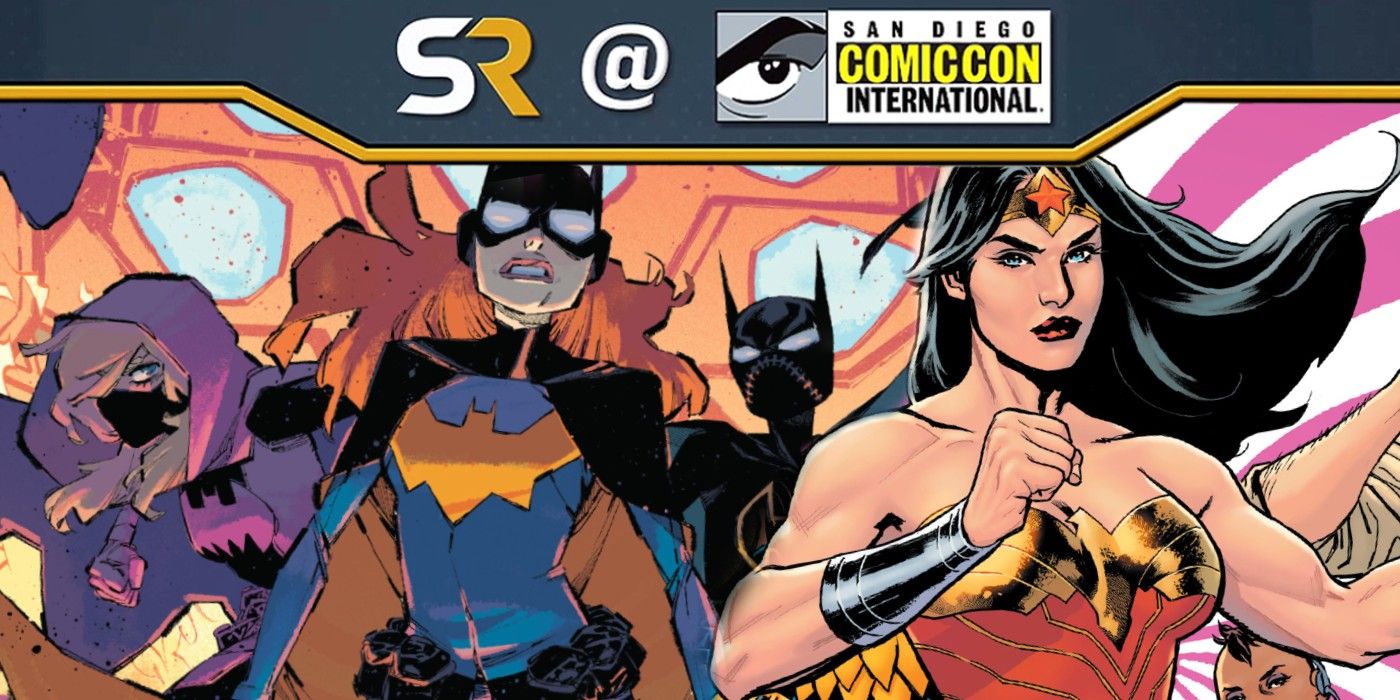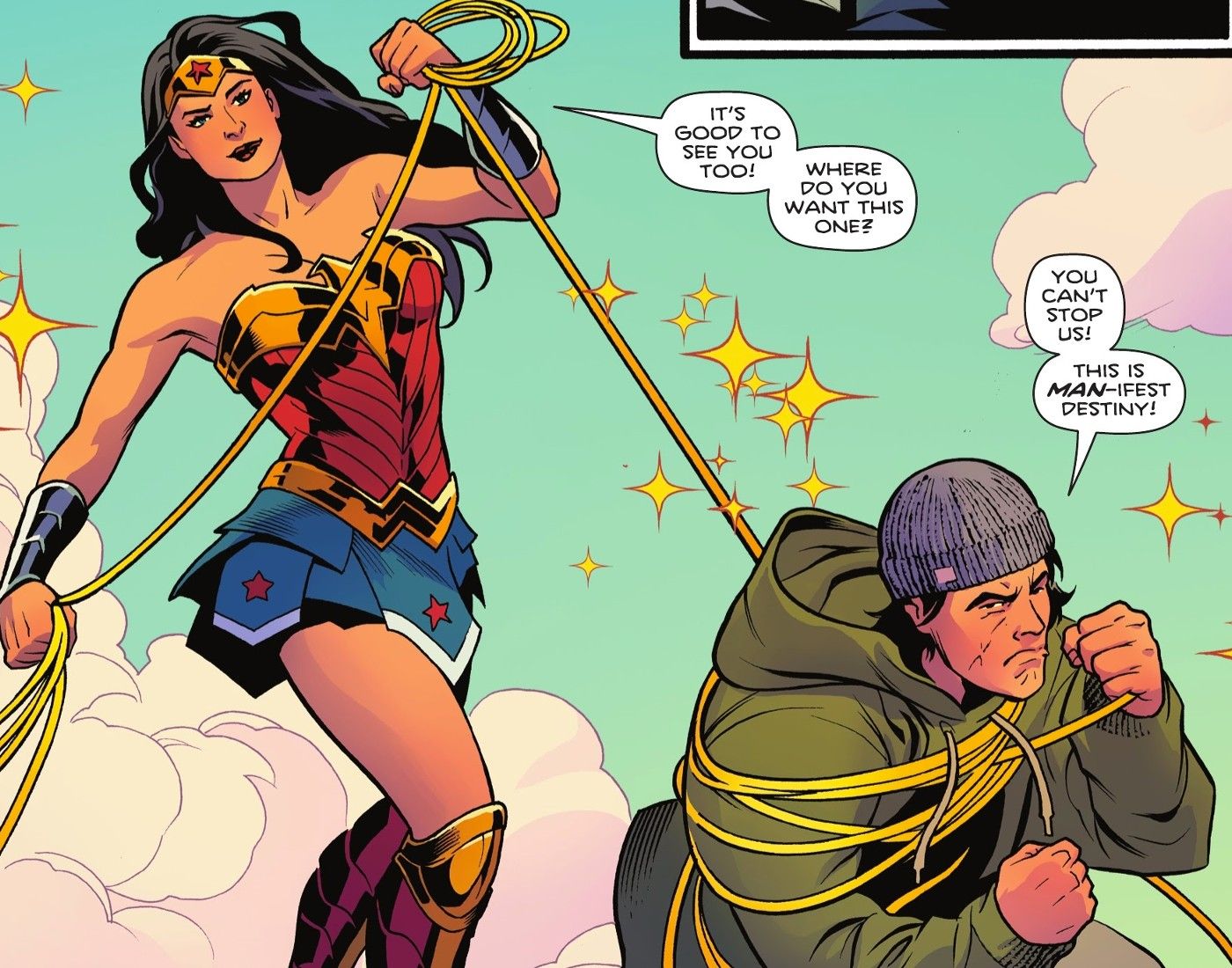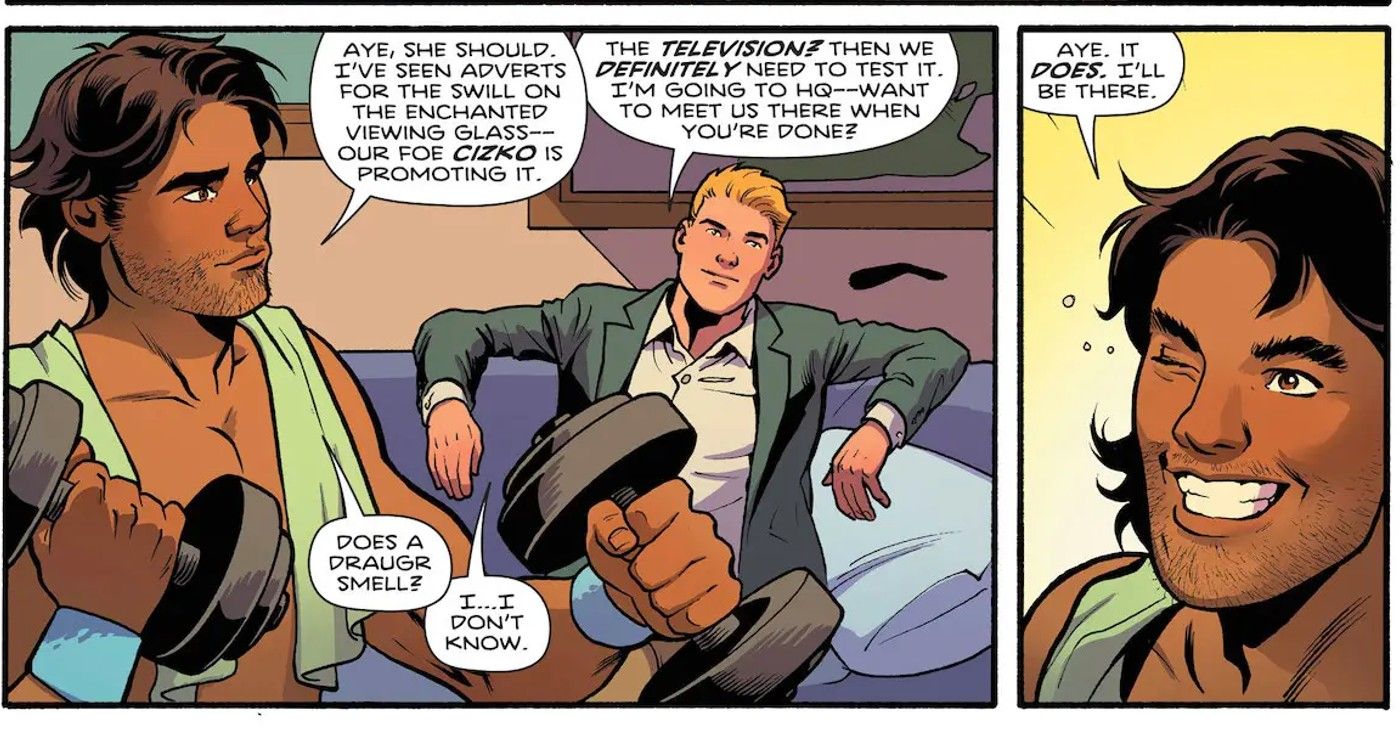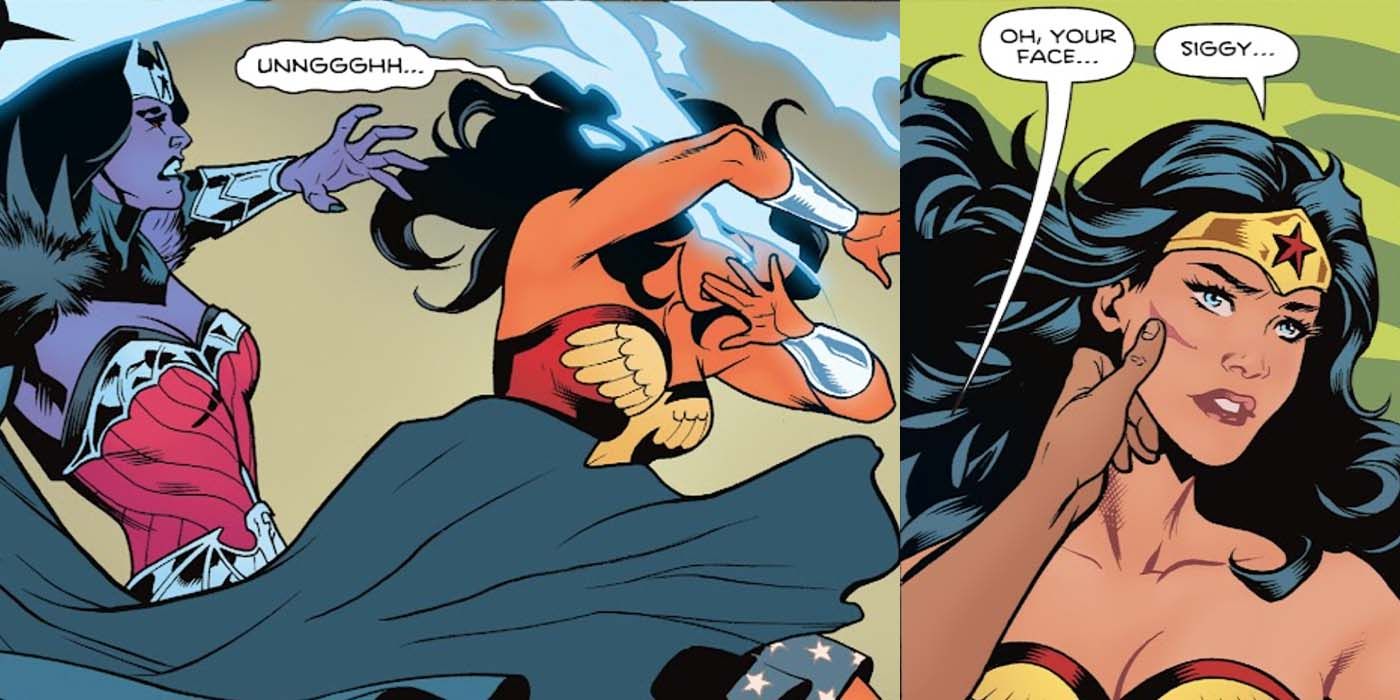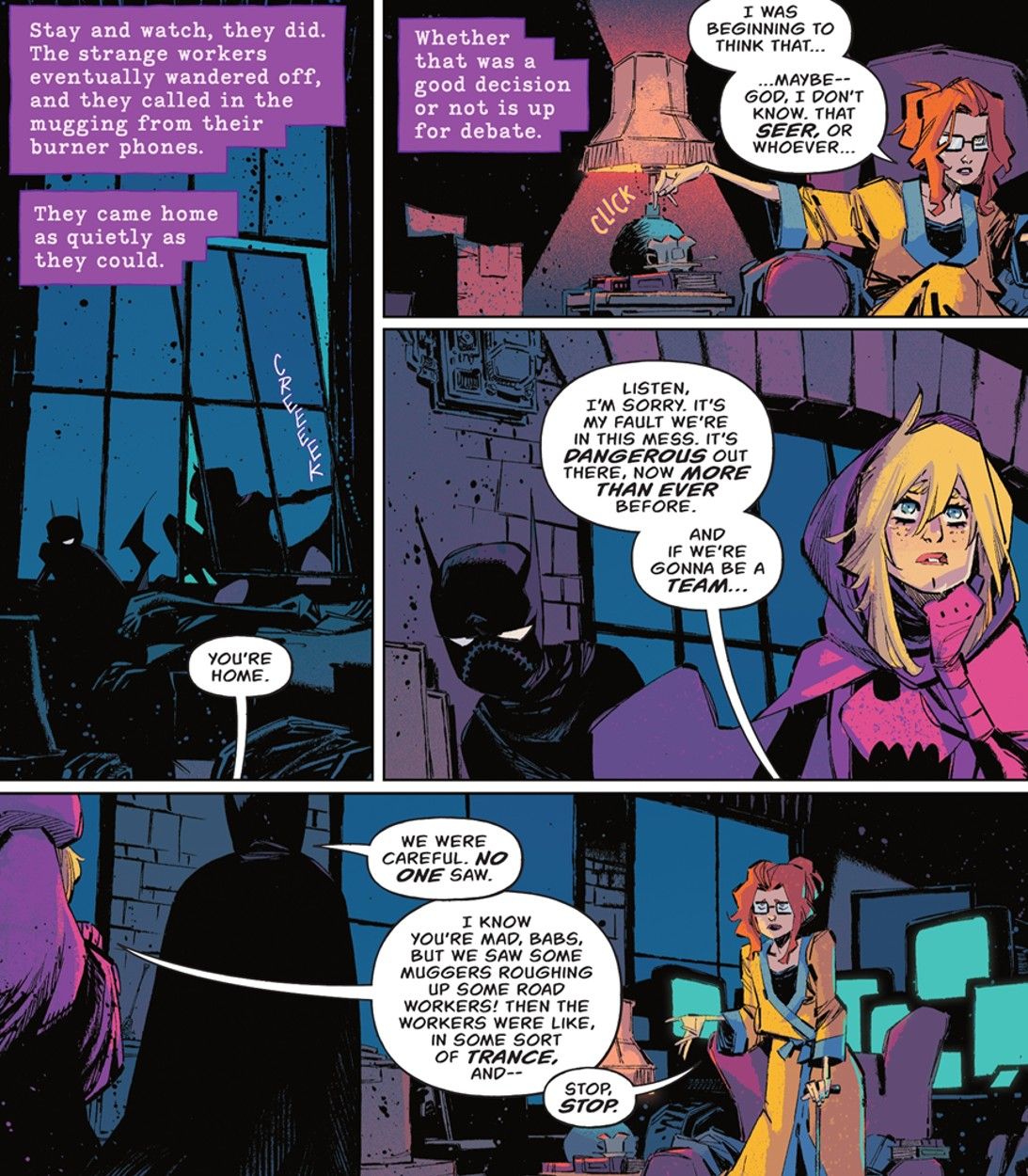It is a transformational time in DC Comics for Wonder Woman and the Batgirls. Co-written by Becky Cloonan and Michael W. Conrad, theWonder Woman and Batgirls series have been pushing their titular characters in a bold new direction for the current Infinite Frontier era, balancing both the epic, mythic qualities of classic DC stories with the grounded humanity that fans love so much. With Wonder Woman's first crossover in decades, The Trial of the Amazons, now behind her, and the Batgirls forging a new meaning for what a legacy role is in the DCU, the future has never looked brighter for these characters.
Currently, in Wonder Woman, Diana has re-entered the world of the living, after dying and spending time in the Afterlife in the "Afterworlds" storyline. With her strong group of allies–Steve Trevor, Etta Candy, and the Viking warrior Siggy–Diana is facing the familiar villain of misogyny represented by the odious Doctor Cizko. In Batgirls, the emergent team made up of Barbara Gordon's Oracle, Stephanie Brown's Batgirl, and Cassandra Cain's Batgirl are working together to keep their corner of Gotham City safe from a new serial killer known as the Hill Ripper. At San Diego Comic-Con, we sat down with writers Becky Cloonan and Michael W. Conrad to discuss the core elements of these characters, and the vision that they have for some of DC's most iconic heroines.
Screen Rant: I love what you're doing with Batgirls and Wonder Woman. Just to start with Diana first, she's been interpreted so many times across all the decades. What are the elements that define your Wonder Woman?
Michael W. Conrad: There's certain things about Wonder Woman that you have to do, if you're going to do Wonder Woman, right? You have to make her independent and strong. These are two key elements of her. Also, there's a feminist quality that's always going to be present there. And it's how she engages with that feminism, in a way, hopefully that isn't off-putting, isn't too over the top, that doesn't come across as preachy, and becomes more of, "This is just your standard operating procedure. This is the way of the Amazons and this is what she's bringing to Man's World." So we've had a lot of fun playing with that and showing the comic book version of her dealing with toxic masculinity and patriarchy and things of that nature.
Becky Cloonan: Yeah. And we're really lucky that we've been on Wonder Woman for so long. We've been able to tackle different parts of her because she is such a dynamic character, and has this lush history that is all valid now, which is a really cool thing with Infinite Frontier, that we can grab from anything that is in her history that we can pull in, like, "Does this work for this story? What can we use?" She's been a warrior. She's an ambassador, she's an agent of peace. She's an agent of hope, she inspires people. And so it's really cool that she can be all these different things. And it's just like anyone you know, you are different things, depending on what is needed of you at the time, like different situations. So she's such a flexible character. And that makes every story interesting. But she's always got these core values that we always come back to, that's kind of a throughline with her.
Michael W. Conrad: The big interest that we want to add to the conversation of Wonder Woman that's been there, but it's not always front and center, is Wonder Woman is a great person, she's the type of person that would be your friend. And something about that is so exciting to me to think like, "Oh, this great warrior who's capable of beating up pretty much anyone in the DCU, she would also sit down for coffee with me."
Becky Cloonan: She's like a demigod and she's an actual god, she's been a god. She's now self-actualized here, because she brought herself back to life, you know? She would still just hang out and be cool. She'd be your friend. That's great.
And I feel like a lot of that is being reflected with Siggy as a character. I absolutely love him, and even with the events of the last couple of issues with just her, going back to feminism, coming up against a lot of misogynists, I feel like just his existence provides this alternate look at masculinity.
Becky Cloonan: Yeah, he has a lot of the same values as her I think, and that's why they've become such great friends. And part of this too, has been great, because we've been able to bring in Etta Candy and Steve Trevor too and just have these different relationships that have been such a part of her history, and being able to bring that back. That's been one of my favorite parts, especially her and Etta, have the most beautiful friendship.
Michael W. Conrad: I think in "Afterworlds" when we met Siggy, thank goodness, we had Travis Moore doing art because we knew that we were doing something a little bit risky, being like, "Oh, Diana is going to meet this gentleman in the Afterlife." And we know that there's people who are interested in seeing Diana in this relationship or that relationship-
Becky Cloonan: or no relationship.
Michael W. Conrad: Or no relationship. Thankfully, Travis Moore was there to draw Siggy as such a snack that everyone's like, "Okay, we're cool with this."
Becky Cloonan: And we wanted Siggy to be the type of character that, even if you might not see them together, like, "Oh, I don't really like that," you root for their friendship. You want to root for him. It's been cool to bring in a new character that been so widely received.
Michael W. Conrad: And taking him out of Asgard and bringing him into our world. I think the low hanging fruit that people were expecting was, "Oh, [Steve] and Siggy are going to be at each other's throats." And now they live together. And now they're like, best friends.
Becky Cloonan: Yeah, I love it.
Michael W. Conrad: So, do with that what you will. They're doing quite well together. So I think being able to contribute a little piece to the ongoing story of Wonder Woman that at this point is 81 years old, it's a huge honor. And it's something that we take really seriously, we pay a lot of attention to what's come before. And we use that to inform where we'd like to take the story as we continue to tell our piece of it.
One moment that was so striking to me was when Diana had a scar on her face from Janus. And I was wondering, in comparison to people like Batman, scars haven't really been part of her character design ever. Are we going to have anything more like that in the future?
Michael W. Conrad: I love that moment. In the West, we've got a really strong idea of what beauty is. And specifically with a female presenting individual, it's always, "Oh, you're pristine, you have no scars, no moles, no this no that," there's only certain body types and things that will adorn the body that are accepted in the mainstream. And we just wanted a moment to kind of challenge that norm. We would like to continue to push that boundary. I think it's important for Diana to be part of that. We try and have the people around her be kind of representative, with a character like Siggy, not to go back to him too much. He's from Asgard. So you would expect a Nordic, blond hair, light-skinned person, but we did a lot of research and discovered oh, many Vikings were actually from various different places. So here's an opportunity to be representative in a way that is in contrast to history.
Similarly, Etta Candy. We've worked with a variety of different artists, and we constantly have to remind certain artists, "Hey, we want Etta to be kind of heavier. Heavier, but healthy and confident and out there kicking butt." So to be able to do something with Diana in the future is a big goal of ours. We are dealing with an iconic character. So it would be hard for us to say she's, you know, she's gonna put on a bunch of weight during COVID like I did.
Becky Cloonan: We got away with a lot in "Afterworlds," I think, because she was dead and because it was the Sphere of the Gods. And a lot of that stuff is like, even though it all happened, at the end, there is a reset button when she comes back to life. And so we can get rid of the scar, we can do these things. So that was a kind of really fun period to get involved with Wonder Woman, because it was kind of like anything goes, and she just went through the wringer with [Dark Nights:] Death Metal. So it was really nice to kind of give her this exuberant, kind of exhausting, breakneck speed wild adventure.
Michael W. Conrad: We'll find other ways. It's coming. Where there's a will, there's a way.
Becky Cloonan: But it was really nice to come in and just hit the ground running and do all this crazy stuff, like she was drinking mead in Valhalla. We have a lot planned with her too. And so we just keep thinking of stories, and everyone really keeps liking them. It's been really good with Wonder Woman.
Absolutely. To switch gears to Batgirls, something that I loved about the book is that the Batgirls emerge as a team of their own rather than just like a role that three people happen to have at once. And so I've noticed there's more of a plurality going on with DC today, just in terms of things like Tim Drake getting his own book again. And so I was curious about from DC's side or your side as creators, how plurality is going to be dealt with in comics today?
Becky Cloonan: I can speak for the Batgirls first, and the great thing about them is that they all have different skills. And that's the best thing about a team, you want to pick characters that will fill the roles. It's like someone's strong at this, and maybe not as good at something else, so you want to build a team with people that work together well, and that have each other's backs. Batgirls, for whatever reason, they all work together in such a good way. They all have different strengths, and they all play against each other. It's a lot of fun.
Michael W. Conrad: I think it's great to have a book that houses these characters together. I also think any of these characters can certainly carry a book on their own.
Becky Cloonan: Oh, yeah.
Michael W. Conrad: I think they would be well received. And I think if people show up and sales are there, then there's a possibility of that happening. What we're kind of confronted with, with every issue of Batgirls, is trying to balance all these things and trying to make sure that we give moments to each of the characters. And some issues, they're certainly going to be like, "Oh, this is more of a this character, that character issue." But I think if people stick around and go for the ride with us, they're going to be really surprised with what we've got coming up and the types of shifting focus that we're going to engage in over the next couple issues. It'll be really fun.
What's your favorite trait for each of the Batgirls?
Becky Cloonan: I'm gonna start with Stephanie, because Stephanie for me was the character that I didn't know as much about going in. So I was really surprised with all the things that I learned about her. Like, when you meet someone, and you think you got them figured out, and then you can hang out with them a little bit, and you're like, "Oh, my God, they're just surprising me left and right." And so that was my favorite thing about learning more about Stephanie. Because we all know like, Cass is a badass. She could probably beat up Batman, and Babs, she's got such a history. And I think she was the Batgirl that I learned about first and was introduced to first.
Michael W. Conrad: This is gonna sound redundant, but I mean, I think we love a lot of the same things about the Batgirls with Cass. Yes, I love that she can beat up anyone in the DCU. I will debate anyone that says otherwise, but you can bring in, you know, the biggest, baddest metahuman, Cass is going to find a way, and I love that about her. Also, just love that she's a little weirdo. Like, you can be a super killer assassin and still be an outsider, by virtue of her interests, and by virtue of the type of life that she's had. So I love that about her.
Becky Cloonan: I love her reading journey, too, I think it's really inspiring. We both love reading and grew up reading books so it's really nice to have a character that you can share that with. And I love her interest in art, she's just so eclectic. She's got a lot going on in her head, and she doesn't speak as much, so it's different to get in there, because Stephanie is the opposite. Stephanie will just say whatever. But it's also hard to get into her head because she'll say the opposite of what she's feeling sometimes, she deflects. And so you have the same problem with opposite sides of the same problem.
Michael W. Conrad: With Steph, I love that she's like a city girl, you know, from Gotham. I grew up in a small suburb in New England. And as soon as I could, I moved to Boston, I was like, "I gotta go to the big city." And immediately I saw, "Oh, there's a huge difference between the city kids and the kids like me who have transferred over here." There's a type of intelligence there. And for Steph to be so street smart and so with it in a lot of ways, but to have such emotional baggage that she's carrying that she's hiding behind, like, "Oh, I'm gonna be the funnest person you've ever been around," it's super dynamic. It's like Cass' flipped on its head. So putting them together and watching them heal each other, with Babs running interference and being like, "Yeah, I'm, right up the middle with you guys."
Becky Cloonan: And Babs has been through it, you know, anything you want to talk about, she's been there and she's done it. So she's the perfect person to help guide them.
Michael W. Conrad: They're all capable women. One of the things that we said when we took on Batgirls was, "We don't want them fighting." It's so cheesy. And that's what always happens with women in comics is they get catty, and they fight over a boyfriend. So boring. Like we just wanted to show healthy relationships.
Becky Cloonan: Yeah, and another thing too is that Babs is a mentor to them. You never stop having mentors. I'm in my 40s and I still have people that I consider mentors. So it's such a healthy thing.
Michael W. Conrad: Sometimes the mentor ends up learning more from the student, honestly, I think we're seeing that a bit with Batgirls, and we hope to continue to explore that kind of idea.
Becky Cloonan: Yeah, there's so much there to dig into. And we're just like scratching the surface. We're like a season, an arc in. There's a lot to go. We have spent a while building the foundations, and now we're digging in.
Batgirls #9 and Wonder Woman #790 are available now from DC Comics.

